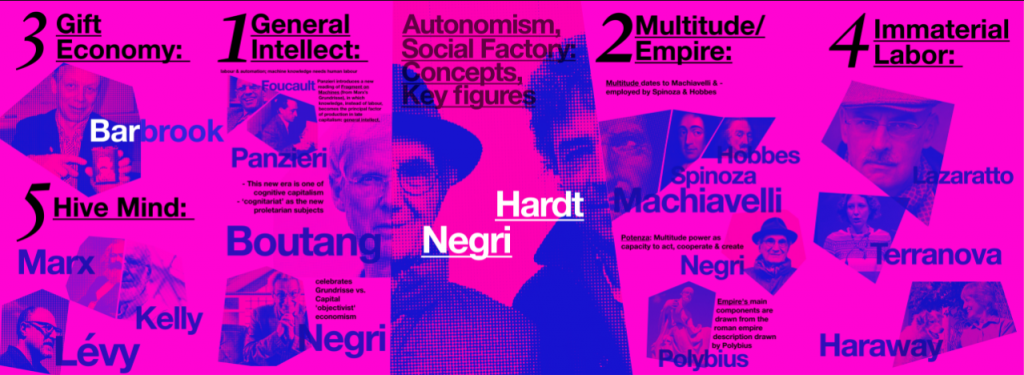Platform Capitalism: Conceptualising the ‘Social Factory’
The core concepts outlined in this visualization relate to society from a post-marxist viewing point: autonomism. The ideas of the operaismo discerned from classical marxism and provided new readings of some of Marx’s famous works, particularly the Grundrisse. According to Panzieri’s reading of Fragment on Machines, knowledge, instead of labour, has become the principal factor of production in late capitalism and gives way to a new interpretation of general intellect. This age of late capitalism is described by Boutang as one of cognitive capitalism, in which commodities contain know-how.
Two other concepts outlined in the visualization are the Empire and the Multitude. In a nutshell, Empire is capital’s ‘power over’ in the age of globalization, and Multitude is a ‘power to’ a theoretical/conceptual collective in terms of their potential. Both concepts are living in an antagonistic symbiosis. The ‘upper hand’ in this relation is to the collective. They just need to realize that. Until then they can use what the Negri & Hardt described as exodus. Put in simple terms, it is the refusal to work. (Keucheyan 85)
The activities performed on platforms are considered by Marxist theorists as labour that produces immaterial data. This extends the exploitative production processes in factories to the whole of society, to everyone using platforms like Amazon, Facebook and Google. As such immaterial labour constitutes the ‘Social Factory’.
Elsewhere on the graphic, the concepts of the gift economy and the ‘hive mind’ are represented. According to Richard Barbrook, the gift economy was a characteristic of the early digital economy, and the distributed and peer-to-peer infrastructures which facilitated its appearance, such as torrenting platforms, suggested that new ways of performing transactions and exchanges could develop on the web (Terranova 35). Related is the concept of the ‘hive mind’, which writers such as Kevin Kelly argued related to the idea of the internet as a whole, comprised of a network of immaterial labour.
References
Keucheyan, Razmig. Left Hemisphere: Mapping Contemporary Theory. Translated by Gregory Elliott, 1 edition, Verso, 2013.
Terranova, Tiziana. Network Culture: Politics for the Information Age. London: Pluto Press, 2004.
